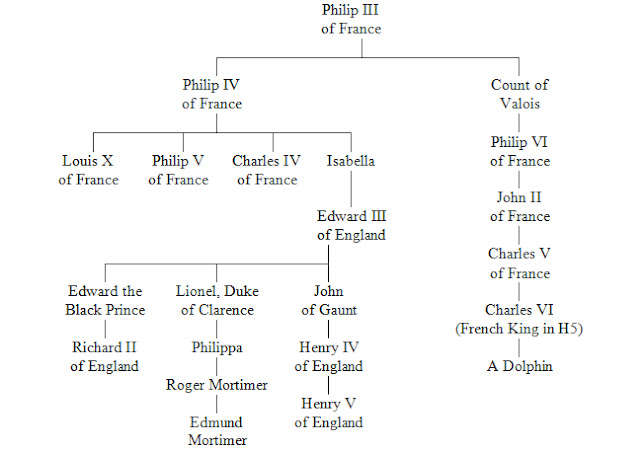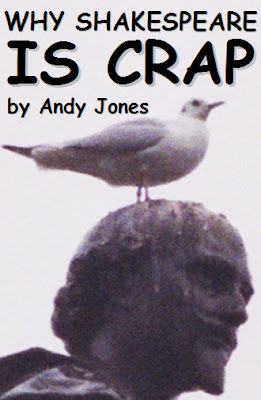Most of the first act of Henry V is taken up with a long scene in Harry’s throne room, commencing with the Archbishop’s detailed (and this is Shakespeare, so it’s very detailed) explanation of Henry’s claim to the French throne, discussing the doctrine In Terram Salicam Mulieres Ne Succedant. (“Salicam” was a famous voyeuristic website in Plantagenet times. It was popular with young noblemen, because Sally could often be seen removing her wimple.) I think I’d like to discuss the Archbishop’s argument at some length. It runs roughly like this: Firstly, you need to examine the French Royal Family tree. The way to analyse the claim to the crown is to work from elder child to younger, which on the following diagram is represented by working from left to right. Only once a person’s line has died out can you move on to the next line across.
Here’s the family tree as far as Edward III:
Basically, the French argument is that Salic law applies. Salic law says that no-one can claim the crown through a female line. Therefore Edward III of England could not claim the French crown through his mother, the French princess Isabella, on the death of Charles IV of France. Accordingly no-one in the line of Philip IV of France has survived with a valid claim. You therefore have to move to the right, and the crown passes down the line of the late Count of Valois.
The archbishop’s argument is that the French are wrong. Salic law does not apply in France itself, only to an area of Germany once colonised by the French. Accordingly a claim through a female line is not ruled out. There are three precedents for a successful claim to the French throne through a female line. Accordingly, the line of Philip IV of France has not died out, and the descendants of Edward III (not the descendants of the Count of Valois) are the true kings of France.
Unfortunately, this argument is, as the Australians put it, fucked. You can see why if you follow the family tree onwards, beyond Edward III:
Do you see the problem? If Salic law doesn’t apply and a claim to the French crown can be established down a female line, then clearly Edmund Mortimer is king of France, since he can claim through his grandmother Philippa.
It boils down to the archbishop saying: Edward III should have been king of France, according to a strict and careful interpretation the family tree in light of the legal precedents and the non-applicability of Salic law. You are the heir to Edward III by a rather vaguer sequence of events which involves a deposition and murder (of Richard II), and applying Salic law to the line of Lionel of Clarence. Therefore you are king of France. QED.
HENRY: May I, with right and conscience, make this claim?
ARCHBISHOP: No.


